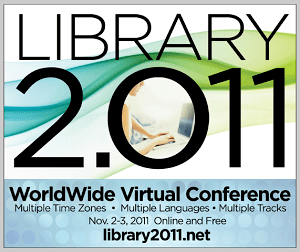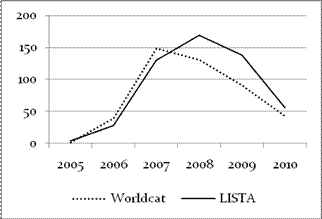好長一段時間沒有再看到或聽到關於 Library 2.0 的報導或研討會了,不過早在今年7月就知道 San José State University 的 The School of Library and Information Science (SLIS) 將主辦一場 Library 2.011 World-wide Virtual Conference,全程都將透過網路進行,這對一直關注 Library 2.0 發展的人來說是個相當振奮人心的消息。

不過就在同一個時間,Walt Crawford 出版了 Library 2.0: A Cites & Insights Reader 一書,內容包含下列幾篇他在部落格Walt at Random 裡的大作:
- Library 2.0 and “Library 2.0”: Volume 6 Issue 2, Midwinter 2006
- Beyond Library 2.0 and “Library 2.0”: Volume 6 Issue 3, February 2006
- Library 2.0 Debased: Volume 8 Issue 3, March 2008
- Library 2.0 Revisited: Volume 9 Issue 9, August 2009
- Five Years Later: Library 2.0 and Balance: Volume 11, Issues 2 and 3, February and March 2011
自 2005年 Michael Casey提出 “Library 2.0″ 這個新名詞至今,6年來即使在世界各地的圖資界帶動起一股2.0風潮,但終究未能獲得所有人的認同。我花了好多時間,斷斷續續的才把 Five Years Later: Library 2.0 and Balance 看完,老實說,他的文章很不容易閱讀,但卻是完整地整理了這幾年來英語系圖資界對 Library 2.0的討論。下面是這文章的連結:
Five Years Later: Library 2.0 and Balance
Essay part 1, PDF、HTML
Essay part 2, PDF、HTML
除了沒有公認的定義這個大問題之外,Library 2.0 的推廣者最令人詬病的是他們大剌剌地倡導者2.0工具及圖書館(員)應該如何…等的宣言,讓技術與非技術人員之間的鴻溝加深。對所謂 Library 2.0服務的成果卻沒有加以檢討,….. 到最後連這些倡導者也摒棄使用 “Library 2.0″ 這個名詞。例如這次 Library 2.011 World-wide Virtual Conference 的keynote speaker 之一,Michael Stephens 的投影片中(pdf) 就找不到 “Library 2.0″ 這個名詞。
上面這一段是我看完 Crawford 文章後腦海裡所記得的,如果知道他的立場的人,應該不會覺得意外,只是公不公正,就讓大家自己去評斷。結論呢? Crawford 引用 Meredith Farkas 去年底一篇博文的結論來做為他的結論:
In the end, I felt like the whole Library 2.0 thing was a distraction. So many libraries jumped on the bandwagon, creating “2.0 services” that were not carefully planned for, staffed or assessed. Now we see a vast 2.0 graveyard of abandoned blogs, wikis, Facebook pages and more. And, in the end, there was never really any agreement on what it all meant. I can’t really see anything good that came from that term or discussions about it. Now, instead of tons of articles, presentations and books about Library 2.0, we will see tons of articles, presentations and books about transliteracy. What real impact will it have on our patrons? How will it change the way we serve them? I feel like a cynical jerk sometimes, but I want to see results. I have no problems with theories as long as they can be applied to our work in some way. My own teaching has been influenced heavily by constructivist learning theory, but I’m not sure what transliterate library services or transliterate instruction looks like. And until someone can show me, I guess I’m going to be as cynical about that as I was about Library 2.0.
Crawford 試圖從 Worldcat.org、Google、Bing、及LISTA去看 Library 2.0的趨勢,顯示這股熱潮在2008之後就逐漸沉寂下來。我覺得這跟後來人們不喜歡用 “Library 2.0″ 這個名詞有關,如果說現今獨領風騷的社群網站也算是 Library 2.0 服務/應用的話,用 social networking 或 Facebook去查找不見得會如此少。

當年 Library 2.0 的倡導之結果也並非一無事處,除了 Web 2.0 的應用外,我覺得在一些觀念上的推廣上就特別成功,例如以使用者為中心,以及主動積極去reach out使用…等。如果各位再看看Michael Stephens 後來的 Hyperlinked Library 講法,就知道後來重點都不在工具本身,而是一些思維上的改變。
本來這篇應該是要在 Library 2.011 World-wide Virtual Conference 召開之前po文的,結果該線上研討會已在前幾天結束了。懶惰是會成為習慣的,久沒發文的我最後還是決定把它po出來,我想不論贊不贊成 “Library 2.0″ 這名詞或概念,聽聽他們都在談些什麼也不錯。3天的會議都有錄影,連結在下面:
Library 2.011 World-wide Virtual Conference - Session & Recording Links
最後, Crawford文章的最後又提到一個新的字 - transliteracy 或者是 library transliteracy,在結論中 Meredith Farkas 的那一篇文章也在談這東西,看來又是一個 buzzword ?!
延伸閱讀:
Information Wants To Be Free - Transliteracy from the perspective of an information literacy advocate
LV 的 Library 2.0 相關文章:
談談 Library 2.0 的未來
Library 2.0 已死?
2.0 的迷茫
先搞清楚 Library 2.0 是什麼
貴館的 Library 2.0 服務算是成功嗎?
Learning 2.1




發表留言